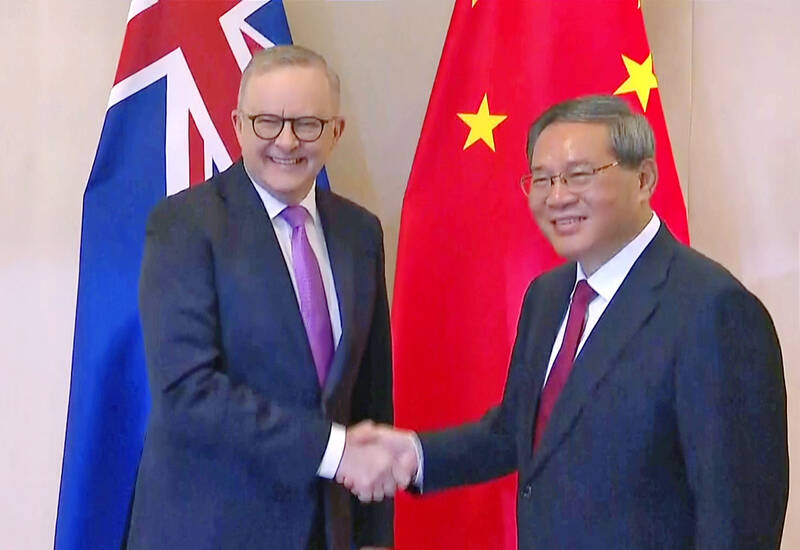Australian Prime Minister Anthony Albanese said China has agreed to lift restrictions on lobster imports by the end of the year, removing one of the last trade barriers imposed by Beijing during a period of tension between the nations.
The rock lobster trade would resume “in time for Chinese New Year,” Albanese said after a meeting with Chinese Premier Li Qiang (李強) in Laos yesterday, referring to the Lunar New Year that is to fall in late January.
RELATIONSHIP

Photo: AP
“We have continued to stabilize the relationship without compromising on any of Australia’s national interests,” Albanese said at a news conference.
“With our patient, calibrated and deliberate approach, we’ve restored Australian trade with our largest export market,” he said.
A restoration of the lobster trade between Australia and China would effectively signal the end of more than four years of economic tensions between the two governments. Beijing imposed curbs on a range of Australian products including barley, wine, coal and seafood following calls by then-Australian prime minister Scott Morrison in 2020 for an international investigation into the origins of COVID-19.
PRODUCTION
In 2018 and 2019, China was the destination for more than 90 percent of Australia’s A$750 million (US$505 million at the current exchange rate) in rock lobster exports, but that fell to about 2 percent by 2022. For last year and this year, Australia’s lobster production is expected to be worth about A$400 million.
If the lobster restrictions are lifted, the only remaining trade bans would be on two small Australian meat works, which contribute a relatively minor amount to trade between the two countries.
Barley tariffs were removed by the Chinese government in August last year, while wine restrictions were removed in March.

Nvidia Corp CEO Jensen Huang (黃仁勳) is expected to miss the inauguration of US president-elect Donald Trump on Monday, bucking a trend among high-profile US technology leaders. Huang is visiting East Asia this week, as he typically does around the time of the Lunar New Year, a person familiar with the situation said. He has never previously attended a US presidential inauguration, said the person, who asked not to be identified, because the plans have not been announced. That makes Nvidia an exception among the most valuable technology companies, most of which are sending cofounders or CEOs to the event. That includes

TARIFF TRADE-OFF: Machinery exports to China dropped after Beijing ended its tariff reductions in June, while potential new tariffs fueled ‘front-loaded’ orders to the US The nation’s machinery exports to the US amounted to US$7.19 billion last year, surpassing the US$6.86 billion to China to become the largest export destination for the local machinery industry, the Taiwan Association of Machinery Industry (TAMI, 台灣機械公會) said in a report on Jan. 10. It came as some manufacturers brought forward or “front-loaded” US-bound shipments as required by customers ahead of potential tariffs imposed by the new US administration, the association said. During his campaign, US president-elect Donald Trump threatened tariffs of as high as 60 percent on Chinese goods and 10 percent to 20 percent on imports from other countries.

Taiwanese manufacturers have a chance to play a key role in the humanoid robot supply chain, Tongtai Machine and Tool Co (東台精機) chairman Yen Jui-hsiung (嚴瑞雄) said yesterday. That is because Taiwanese companies are capable of making key parts needed for humanoid robots to move, such as harmonic drives and planetary gearboxes, Yen said. This ability to produce these key elements could help Taiwanese manufacturers “become part of the US supply chain,” he added. Yen made the remarks a day after Nvidia Corp cofounder and chief executive officer Jensen Huang (黃仁勳) said his company and Taiwan Semiconductor Manufacturing Co (TSMC, 台積電) are jointly

MARKET SHIFTS: Exports to the US soared more than 120 percent to almost one quarter, while ASEAN has steadily increased to 18.5 percent on rising tech sales The proportion of Taiwan’s exports directed to China, including Hong Kong, declined by more than 12 percentage points last year compared with its peak in 2020, the Ministry of Finance said on Thursday last week. The decrease reflects the ongoing restructuring of global supply chains, driven by escalating trade tensions between Beijing and Washington. Data compiled by the ministry showed China and Hong Kong accounted for 31.7 percent of Taiwan’s total outbound sales last year, a drop of 12.2 percentage points from a high of 43.9 percent in 2020. In addition to increasing trade conflicts between China and the US, the ministry said